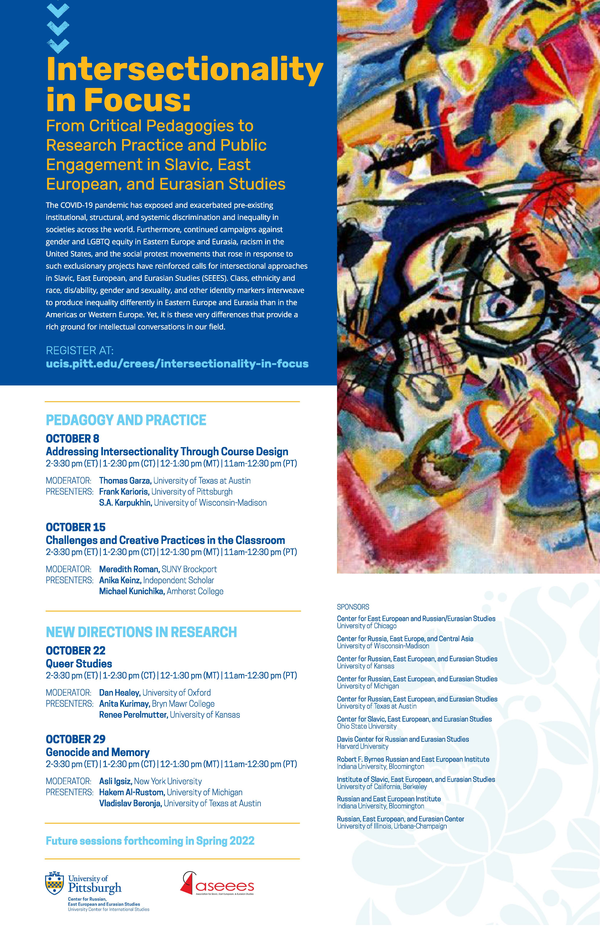- Sponsor
- Association for Slavic, East European, and Eurasian Studies Committee for Advocating for Diversity and Inclusion; University of Pittsburgh Center for Russian, East European, and Eurasian Studies; University of Chicago Center for East European and Russian/Eurasian Studies; University of Wisconsin Center for Russia, East Europe, and Central Asia; University of Kansas Center for Russian, East European, and Eurasian Studies; University of Michigan Center for Russian, East European, and Eurasian Studies; University of Texas Center for Russian, East European, and Eurasian Studies; Ohio State University Center for Slavic, East European, and Eurasian Studies; Harvard University Davis Center for Russian and Eurasian Studies; Indiana University Inner Asian and Uralic National Resource Center; University of California Institute of Slavic, East European, and Eurasian Studies; University of Illinois Russian, East European, and Eurasian Center; Indiana University Robert F. Byrnes Russian and East European Institute
- Cost
- Free and open to the public.
- Registration
- Registration
- Contact
- REEEC
- reec@illinois.edu
- Views
- 67
Part of the online series, Intersectionality in Focus: From Critical Pedagogies to Research Practice and Public Engagement in Slavic, East European, and Eurasian Studies
The COVID-19 pandemic has exposed and exacerbated pre-existing institutional, structural, and systemic discrimination and inequality in societies across the world. Furthermore, continued campaigns against gender and LGBTQ equity in Eastern Europe and Eurasia, racism in the United States, and the social protest movements that rose in response to such exclusionary projects have reinforced calls for intersectional approaches in Slavic, East European, and Eurasian Studies (SEEES). Class, ethnicity and race, dis/ability, gender and sexuality, and other identity markers interweave to produce inequality differently in Eastern Europe and Eurasia than in the Americas or Western Europe. Yet, it is these very differences that provide a rich ground for intellectual conversations in our field.
OCTOBER 15
Challenges and Creative Practices in the Classroom
2-3:30 pm (ET) | 1-2:30 pm (CT) | 12-1:30 pm (MT) | 11am-12:30 pm (PT)MODERATOR:
Meredith Roman is Associate Professor in the Department of History and the Department of Women & Gender Studies at the College at Brockport, State University of New York. Professor Roman specializes in Comparative Soviet and African American Histories. Prof. Roman has received high praise for teaching and was awarded the Chancellor's Award for Excellence in Teaching in 2012. Prof. Roman studied Azerbaijani as a FLAS Fellow and received her Ph.D. from Michigan State University. Currently, Prof. Roman's research focuses on dissent in the 1960s and 1970s with her most recent publication, Armed and Dangerous: The Criminalization of Angela Davis and the Cold War Myth of America's Innocence (University of Illinois Press), explores the racialization of Angela Davis as a "black militant" within the context of the Cold War’s ideological struggle.
PRESENTERS:
Anika Keinz studied European Ethnology and Art History at Humboldt Universität zu Berlin and Freie Universität Berlin, receiving her Ph.D. in European Ethnology from Humboldt-University Berlin in 2007. She was Assistant Professor for Comparative Central European Studies and Junior Professor of Comparative Social and Cultural Anthropology of late-modern Societies at European University Viadrina in Frankfurt (Oder). In her research and teaching, she is concerned with social and political transformation processes, pluralism, inequality studies, bodies and discourses of (dis-) belonging, gender studies, biographies and queer anthropology. She is the author of Polens Andere. Verhandlungen von Geschlecht und Sexualität in Polen nach 1989 (transcript Verlag, 2008). She currently works as independent researcher.
Michael Kunichika is Associate Professor of Russian at Amherst College. His research interests include 20th century Russian and Soviet literature, archaeology and anthropology's cultural history and philosophy, critical theory, and exploration of links between cultural production to archaeology, anthropology, and ethnography. Professor Kunichika received his Ph.D. from the University of California Berkeley. One of his current projects titled “Specters of Empire: Early Soviet Cinema and the Representation of Race” considers the relationship between race, cinematic form, and imperial/anti-imperial politics during the Soviet Union. In addition, Prof. Kunichika received an honorable mention for the Wayne S. Vucinich Book Prize from the Association for the Advancement of Slavic, East European, and Eurasian Studies for his first book Our Native Antiquity (Academic Studies Press, 2015).
